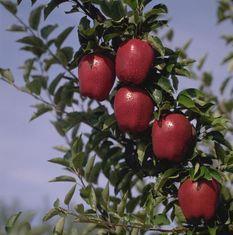
The Washington organic apple growing industry is seeing around 15 per cent growth each year. In terms of shipments to the UK, between 25 and 30 per cent of exports are organic, and the industry is likely to continue to expand.
Matt Miles, at Sage Fruit Co, has noted that its organic offer has increased considerably in the last 12 months. “Our total number of acres in organic production has risen by 35 per cent from the 2002 crop season,” he says. “However, our total number of cases produced will see only a marginal increase of approximately 10 per cent. This was due to the poor fruit set and hot weather conditions we experienced last fall. These conditions have had an impact on the number of cases exported to the UK.”
Rainier Fruit Company is one of the largest growers and shippers of fresh apples in the region. The company has been growing organic fruit for many years but it was not until last year that it focused sales attention on the organics market. Director of business development Suzanne Wolter explains: “We have extended our conventional grading standards into our organic products and have received nothing but positive feedback for our efforts this season.”
Wolter believes that certain varieties have experienced increased demand in the last 12 months. “We have seen more demand for Gala, Fuji, Granny and Braeburn - organic customers request the newest and more unique varieties. Conversely we have seen a decrease in the availability of Golden Delicious,” she says.
Harold Ostenson, of Pacific Organic Produce has seen demand increase for several new varieties. He says: “The German apple Pinova and the Honeycrisp and Pink Lady varieties are gaining in demand. There has also been a lot more Cameo apples available as new trees become productive.”
Miles picks out a clear winner in terms of best selling lines. “Organic Gala sales into the UK have doubled each year for the last two years. Another success is Organic Fuji,” he says. “This is definitely a growing category, the only limitation has been sizing. Fuji tends to be large, peaking at 64/72 count and the preferred size in the UK has been 113/125 count. Mind you, I do believe the volumes of organic Fuji will continue to grow over the forthcoming years.”
Wolter feels that organic consumption will continue to grow for sometime yet. “Organic consumption worldwide is growing at varying levels. Many countries are experiencing double digit increases in their organic category,” she says. “To increase consumption further it is important growers expand the varieties available and offer organic quality every bit as good as conventional. Inferior organic products are no longer acceptable.”
Miles equally is confident of demand increasing. He says: “We have implemented our EurepGAP programme, and we have anticipated our market share to increase even more than last year. To date, the main factor limiting our sales in the UK has been availability of the correct product. It is not easy to grow apples that will maintain the proper pressure and sugar levels required to meet the standards required for exporting to the UK. The best way for Washington State organic apple growers to distinguish themselves from the apples grown in Europe is through the consistent quality of our produce.”
Quality and choice appear to be the biggest barriers to success but the growers will continue to work hard. Ostenson explains: “We need more quality choices, improved volumes and year-round supply.” Wolter agrees that this does provide a headache. She says: “Inferior quality combined with high prices can make it difficult at times.”
Miles is frustrated at the withdrawal from use for the UK market of antibiotic sprays that kill Fire Blight. He says: “This is our main barrier to increased volumes of organic apples reaching the UK. The use of Microshield and other types of antibiotic sprays are legal for use under the USDA organic requirements in the US. But these are not allowed on products going to the UK. Growers that are located in areas with a heavy blight threat have no option, if they don’t use an antibiotic spray for Fire Blight, they run the risk of killing all their trees. Also, the most popular varieties of apples in the UK, such as Gala and Cripps Pinks are the varieties most susceptible to Fire Blight.”
Despite these drawbacks growers are confident for long-term future success. Wolter says: “In the US more mainstream retailers are beginning to focus on the organic offerings in their produce departments to compete with the organic specialists and independent operations.” Ostenson is equally confident. “There will come a time when organic fruit dominates the produce displays,” he says.
Miles believes that movement in price is also key to future success. “The main constraint has been the price point at the retail level. Finally, in the 2003 crop season we have seen the domestic retail pricing for our product has come down and consumer demand for our product has increased dramatically,” he says. “The retailers in the UK have been more responsive to our cost reductions, and this is one of the contributing factors in our increased overseas demands.”
Miles has clear goals set for the 2004 season. He says: “Our total acreage in organic production is expected to increase again by 35 per cent in the 2004 season. With a good set and optimal weather conditions we could see an increase in the total cases produced of more than 80 per cent. Our goal is to double our export volume to the UK in the 2004 season. By producing larger volumes of high quality fruit we will increase our ability to develop a consistent supply to our customers.”